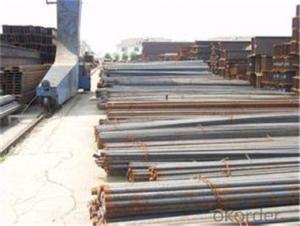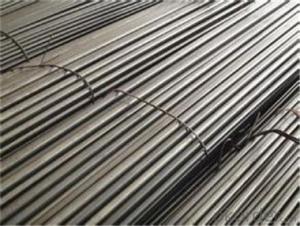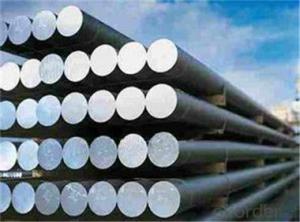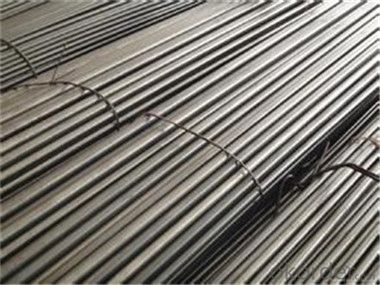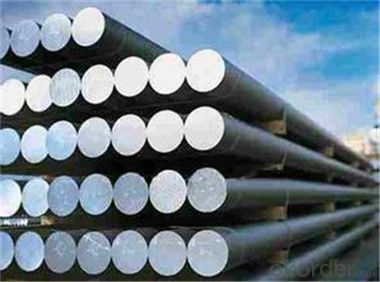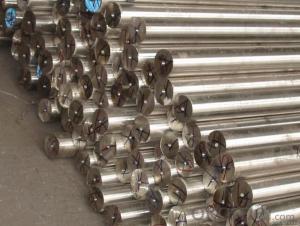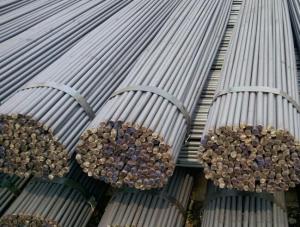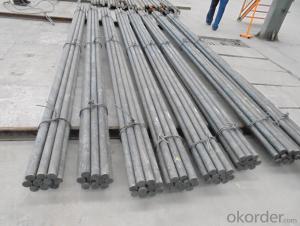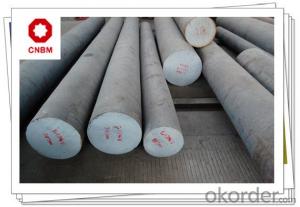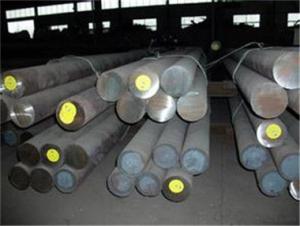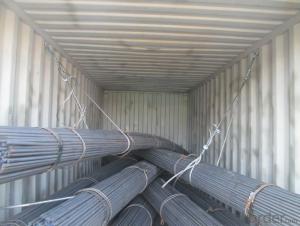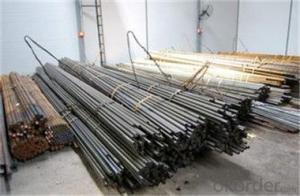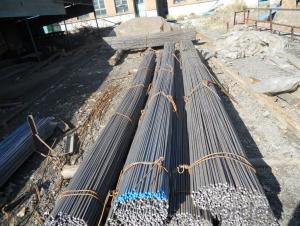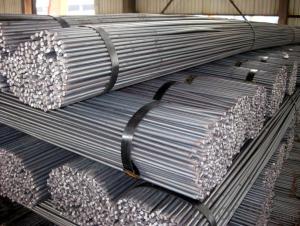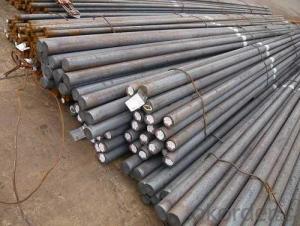Hot Rolled Steel Round Bars Bearing Steel from China
- Loading Port:
- Tianjin
- Payment Terms:
- TT OR LC
- Min Order Qty:
- 900 m.t.
- Supply Capability:
- 2000000 m.t./month
OKorder Service Pledge
OKorder Financial Service
You Might Also Like
Description of steel round bar:
1. Commodity: Round steel bar
3. Technical: Hot rolling
2. Length: Min. 5.8meter, according to requirement.
3. Diameter: 16mm-250mm
5. Packing: In Bundle or according to your requirements.
Festures of steel round bar:
1.Dia 80-800mm Length:2000-13000mm or as required
2.Technique:Forged
3.Delivery Time:45 days
Specifications of steel round bar:
1. Commodity: Round steel bar
3. Technical: Hot rolling
2. Length: Min. 5.8meter, according to requirement.
3. Diameter: 16mm-250mm
Mild Steel Round Bar is used for making security grills, screens, Construction and Machine Manufacture.Stainless steel bar is widely used in Architecture,Machine Manufacture,Power Station,Electric Equipment and Factory,Oil and Chemical Industry,Food and Medical Industry,
City Decoration Industry
Images of coffee machine:
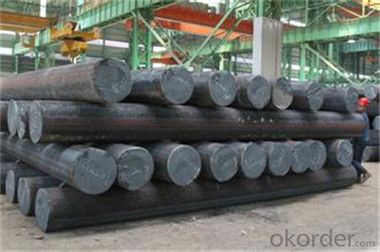
FAQ:
1. What is your package?
Packing situation: standard seaworthy packing or as customer required.
2. How long is the lead time?
Delivery time: 45 days after order confirmed.
3. What payment term do you accept?
Payment: T/T or L/C at sight.
- Q: Are steel round bars suitable for marine propeller applications?
- Yes, steel round bars are suitable for marine propeller applications. Steel is a widely used material in marine engineering due to its high strength, durability, and corrosion resistance. Steel round bars provide the necessary strength and stiffness required for propeller applications, ensuring efficient propulsion and withstanding the harsh conditions of marine environments.
- Q: What are the different types of threads used for steel round bars?
- There are several different types of threads that can be used for steel round bars, depending on the specific application and requirements. Some of the most common types of threads used for steel round bars include: 1. Unified National Coarse (UNC) Thread: This is the most widely used thread type for general-purpose applications. It has a relatively coarse pitch and is suitable for most common applications where high strength is not required. 2. Unified National Fine (UNF) Thread: This thread type has a finer pitch compared to UNC threads and offers better resistance to vibration. It is commonly used in applications where a higher level of thread engagement and better thread performance is required. 3. Metric Thread: Metric threads are widely used in countries that adopt the metric system. They are defined by their pitch, which is the distance between each thread. Metric threads offer a precise and standardized threading solution for various applications. 4. Acme Thread: Acme threads have a trapezoidal shape and are commonly used in applications that require high strength and resistance to wear and tear. They are often employed in heavy-duty machinery, such as lead screws, jackscrews, and power transmission systems. 5. Buttress Thread: Buttress threads have a triangular shape with one side being perpendicular to the axis of the thread. This unique design allows for high load-bearing capacity and resistance to axial forces in one direction. Buttress threads are commonly used in applications that involve high-pressure fluid flow, such as hydraulic cylinders and pumps. 6. Whitworth Thread: Whitworth threads were widely used in the past but have become less common nowadays. They have a rounded profile and a coarse pitch. Whitworth threads are often found in older machinery and equipment. It is important to select the appropriate thread type for a specific application to ensure proper fit, functionality, and durability of the steel round bar. The choice of thread type will depend on factors such as load requirements, environmental conditions, compatibility with mating parts, and industry standards.
- Q: What are the different grades of carbon steel round bars for structural applications?
- The different grades of carbon steel round bars commonly used for structural applications include ASTM A36, ASTM A572, and ASTM A992.
- Q: Are steel round bars prone to fatigue failure?
- Yes, steel round bars are prone to fatigue failure. Fatigue failure is the result of repeated cyclic loading or stress on a material, causing it to weaken and eventually fail, even when the applied stress is below its ultimate strength. Steel round bars, like any other structural material, are susceptible to fatigue failure due to their inherent characteristics. Fatigue failure in steel round bars can occur due to various factors, including improper design, inadequate material selection, manufacturing defects, or excessive cyclic loading. Factors such as surface defects, notches, stress concentrations, and corrosive environments can further accelerate the fatigue process. To mitigate the risk of fatigue failure, engineers and designers employ various strategies such as implementing appropriate design practices, selecting high-quality materials, conducting thorough inspections, applying stress-relieving treatments, and considering the impact of cyclic loading during the structural design phase. It is important to note that while steel round bars are prone to fatigue failure, the actual susceptibility depends on numerous factors, including the specific steel grade, loading conditions, environmental factors, and overall structural design. Therefore, it is crucial to carefully assess these factors and employ appropriate mitigation measures to ensure the safe and reliable performance of steel round bars in various applications.
- Q: How are steel round bars stored?
- Steel round bars are typically stored in a vertical position, either stacked on racks or placed in specially designed shelves or racks. These storage methods ensure that the bars are well-supported and easily accessible for transportation and use. Additionally, steel round bars are often bundled or strapped together to prevent them from rolling or becoming disorganized.
- Q: Can steel round bars be used in the energy industry?
- Yes, steel round bars can be used in the energy industry. Steel round bars are commonly used in various applications within the energy industry, such as in the construction of pipelines, power plants, and oil and gas infrastructure. They provide high strength and durability, making them suitable for withstanding the demanding conditions and requirements of the energy sector.
- Q: What is the difference between a smooth and a precision ground steel round bar?
- A smooth steel round bar refers to a steel rod that has a plain surface without any specific surface treatment or finishing process. It is typically produced through hot rolling or cold drawing methods, resulting in a basic cylindrical shape with a relatively rough surface texture. Smooth steel round bars are commonly used in various applications where a smooth exterior finish is not a critical requirement. On the other hand, a precision ground steel round bar undergoes an additional manufacturing process to achieve a more precise and refined surface finish. The precision grinding process involves removing any imperfections or irregularities from the surface of the steel rod, resulting in a highly smooth and polished finish. This process ensures that the diameter of the round bar remains consistent along its length and that the surface has a superior level of finish and accuracy. Precision ground steel round bars are widely used in applications that demand tight tolerances, precision machining, or where a smooth and polished surface is essential. Industries such as aerospace, automotive, tooling, and manufacturing often rely on precision ground steel round bars for their high-quality surface finish, dimensional accuracy, and reliable performance. In summary, the main difference between a smooth and a precision ground steel round bar lies in the surface finish and level of precision achieved. While a smooth steel round bar has a basic, rough surface texture and is suitable for general applications, a precision ground steel round bar undergoes additional grinding processes to achieve a highly smooth, polished, and accurate surface finish, making it ideal for applications requiring tight tolerances and precision machining.
- Q: What is the difference between a smooth and a ribbed steel round bar?
- A smooth steel round bar is a solid cylindrical piece with a smooth surface, whereas a ribbed steel round bar has raised ridges or ribs along its length. The ribs on a ribbed bar provide better grip and adherence when used in construction and reinforcement applications, while the smooth bar is often used in applications where a sleek and polished appearance is desired.
- Q: Why is the round bar bent?
- Round steel with hooks the aim is to increase the bond between concrete and prevent the component in the tension will be reinforced. Therefore, round bars should be 180 degrees of hook, should set up 90 degree hook ribbed bar.
- Q: What are the different surface treatments for steel round bars?
- There are several different surface treatments available for steel round bars, each serving a specific purpose and providing unique benefits. Some of the most common surface treatments for steel round bars include: 1. Hot-dip galvanizing: This process involves immersing the steel round bars in a bath of molten zinc, which creates a protective coating that helps prevent corrosion and rusting. Hot-dip galvanizing is an effective treatment for steel round bars used in outdoor or corrosive environments. 2. Painting: Applying a coat of paint to the surface of steel round bars not only enhances their appearance but also provides a protective barrier against moisture and oxidation. Painting is commonly used for decorative purposes or when a specific color is desired. 3. Powder coating: Powder coating involves applying a dry powder to the steel round bars, which is then cured under heat to form a durable and attractive finish. This treatment offers excellent resistance to impact, chemicals, and UV rays, making it suitable for various applications. 4. Electropolishing: This process uses an electric current and an electrolyte solution to remove a thin layer of the steel round bars' surface, resulting in a smooth and shiny finish. Electropolishing improves the appearance and corrosion resistance of the steel, making it ideal for applications that require a high level of cleanliness and aesthetics. 5. Passivation: Passivation involves treating the steel round bars with an acid solution to remove any free iron or iron oxide from the surface, thus enhancing their corrosion resistance. Passivation is commonly used for stainless steel round bars to increase their longevity and prevent staining or rusting. 6. Shot blasting: Shot blasting is a mechanical surface treatment that involves bombarding the steel round bars with small steel balls or particles at high velocity. This process removes any surface contaminants, scale, or rust, resulting in a clean and roughened surface that improves adhesion for subsequent coatings or treatments. 7. Chrome plating: Chrome plating is a technique where a thin layer of chromium is electroplated onto the surface of steel round bars. This treatment provides excellent corrosion resistance, wear resistance, and a shiny appearance, making it suitable for applications that require durability and aesthetics. Overall, the choice of surface treatment for steel round bars depends on the specific requirements of the application, such as corrosion resistance, aesthetics, or wear resistance. It is important to carefully consider the intended use and environmental conditions before selecting the most appropriate surface treatment for steel round bars.
Send your message to us
Hot Rolled Steel Round Bars Bearing Steel from China
- Loading Port:
- Tianjin
- Payment Terms:
- TT OR LC
- Min Order Qty:
- 900 m.t.
- Supply Capability:
- 2000000 m.t./month
OKorder Service Pledge
OKorder Financial Service
Similar products
Hot products
Hot Searches
